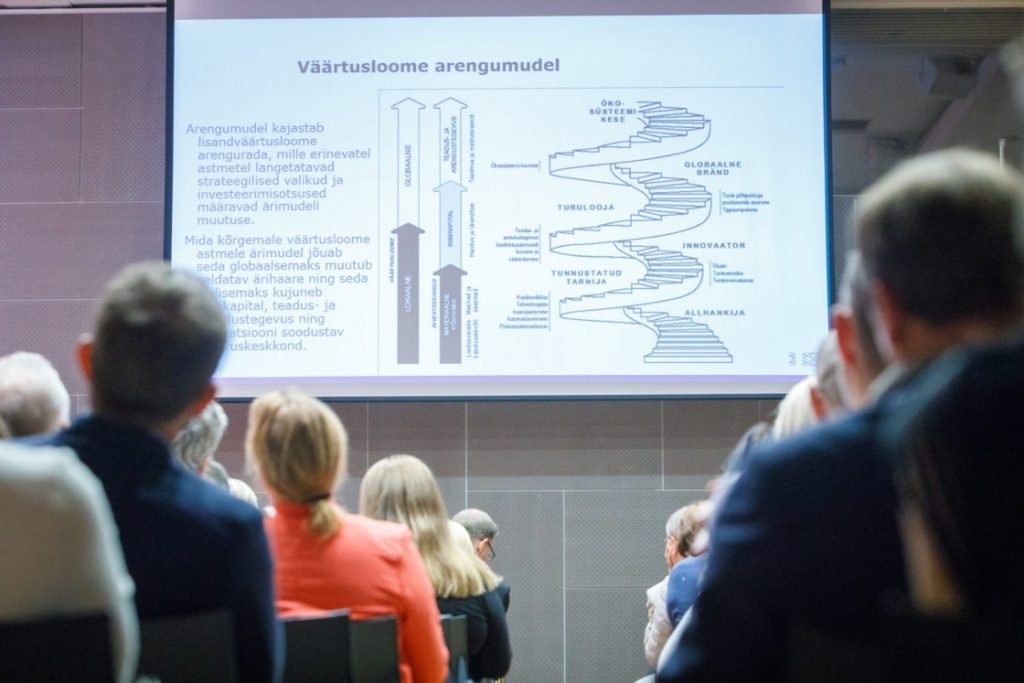The development of Estonian businesses requires investments into technology, development and branding
The new study commissioned by the Foresight Centre shows that the Estonian businesses tailor their strategies mainly to the needs of the existing clients and not the expectations of the markets more broadly. At the same time, the development activities focus on improving the efficiency of the production, and not diversifying the portfolio of products and services. Investments into technology and research and development also remain in the background.

These keywords indicate that Estonian businesses are at a relatively simple stage of the value chain in terms of development, the researchers of Tallinn University of Technology found in the study.
The researchers also propose a unique value creation development model for businesses that shows the factors that are important if businesses wish to move to higher stages in the international value chains, and be competitive and increase their productivity. “As a business moves upwards in the value chain, more importance is placed on research and development, international scope and international networks, and further development also presumes a longer-term and more diversified funding model,” said expert of the Foresight Centre Mari Rell who leads the research project on productivity due to be completed this autumn.
In the lower levels of the development model based on the value chain, the development activities of businesses focus on improving the efficiency of the production, and on investments into machinery and equipment. In the medium stages of the development model, development presumes investment into the adoption of new technologies, quality development as well as branding.
As businesses move to higher stages with their business models, more attention is paid to the research and development activities, cooperation and international networking of the business. When a business has advanced to the stage where it has created a global brand or ecosystem, the abovementioned are supplemented with legal certainty of the economic environment, including modern-level protection of intellectual property and the existence of high-level human capital and science capability.
Estonian undertakings consider the smallness of the Estonian economy, and the vulnerability of businesses arising from the fluctuation of the demand, the limited market power and a high price sensibility, the greatest obstacles in the development of business models. On the other hand, however, if business models in the lower stages of the value chain prevail among businesses, it is manifested in the fluctuation of economic growth, and external shocks can easily hurt the economy.
“Innovators who are oriented to the global market and have a long-term development strategy, and who offer competitive products or services, are less sensible to short-term price fluctuations and, thanks to that, contribute to the macro-stability and sustainability of the economic development of the country,” Rell pointed out.
The study also reveals that Estonian businesses monitor productivity, but they do not prioritise productivity growth, and capital-intensive investments into fixed assets continue to dominate in investments, instead of spendings on knowledge creation and development of people who could also be relied on in the development of business models. There is a widespread attitude among undertakings whereby they do not attach importance to their role in the training of the labour force, while at the same time the lack of skilled labour force is pointed out as a significant impediment in increasing productivity.
The Foresight Centre is conducting a study project focusing on the developments of productivity with the aim of assessing the growth prospects of added value and analysing the potential sources for growth of productivity in the coming 10–15 years. The study “Do the Investments of Companies Contribute to Productivity?” was commissioned by the Foresight Centre and its authors are Kadri Männasoo, Mait Rungi, Heili Hein, Aaro Hazak and Helery Tasane from Tallinn University of Technology. The research project on productivity will be completed in autumn 2018.
Full text of the study report and the summaries can be read here (in Estonian): https://arenguseire.ee/uurimissuunad/tootlikkus/
Latest news
-
27.06 2025Current low birth rate will lead to up to 1.3 billion euros less tax revenue in the future
In its new short report “The impact of population ageing and low birth rate on long-term state revenue and expenditure”, the Foresight Centre notes that the lower than projected birth rate will reduce government spending on family policy and education, but in the long term, it will mean up to 1.3 billion euros less in tax revenue.

 An independent think tank at the Riigikogu
An independent think tank at the Riigikogu